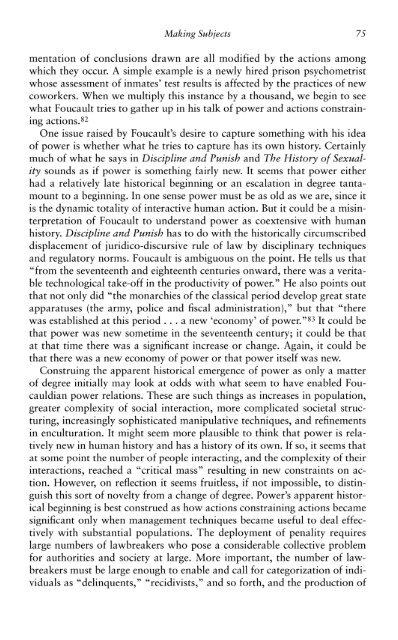Starting with Foucault: An Introduction to Genealogy, Second Edition
Starting with Foucault: An Introduction to Genealogy, Second Edition
Starting with Foucault: An Introduction to Genealogy, Second Edition
Create successful ePaper yourself
Turn your PDF publications into a flip-book with our unique Google optimized e-Paper software.
Making Subjects 7.5mentation of conclusions drawn are all modified by the acrions amongwhich they occur. A simple example is a newly hired prison psychmetristwhose assessment of inmates' test results is affiected by the practices of newcoworkers. When we mulriply this instance by a thousand, we be& <strong>to</strong> see&at <strong>Foucault</strong> tries <strong>to</strong> gather up in his talk ol power and actions constrainingactians.82One issue raised by Fotrcault's desire <strong>to</strong> capture something <strong>with</strong> his ideaof power is whether what he tries <strong>to</strong> capture has its awn his<strong>to</strong>ry Certainlymuch of what he says in Dkcipki~e and Punz'sh and The Hk<strong>to</strong>ry of Sexualitysounds as if power is something fairly new It seems that power eitherhad a relatively late his<strong>to</strong>rical beginning or an escalation in degree tantamount<strong>to</strong> a beginning.. In one sense power must be as old as we are, since itis the dynamic <strong>to</strong>tality of interactive human aaion, But it could be a misinterpretationof <strong>Foucault</strong> <strong>to</strong> understand power as coextensive <strong>with</strong> humanhis<strong>to</strong>ry. Dkcipki~e and Punkh has <strong>to</strong> do <strong>with</strong> the his<strong>to</strong>rically circumscribeddispfacement of juridico-discursive rule of law by disciplinary techniquesand regula<strong>to</strong>ry norms. <strong>Foucault</strong> is ambiguous on the paint, He tells us that"from the seventeenth. and eighteenth centuries onward, there was a veritabletechnological take-off in the productivity of power." He also points outthat not only did "he monarchies of the classical period develop great stateapparatuses (the army3 police and fiscal administrationf,'"utthat "therewas established at this period . . . a new kconomybf power,""" It could bethat power was new sometime in the seventeenth century; it could be thatat that time there was a significant increase or change, Again, it could bethat there was a new economy of yower or that power itself was newConstruing the apparent his<strong>to</strong>rical emergence of power as only a matterof degree initially may look at odds <strong>with</strong> what seem <strong>to</strong> have enabled Foucauldianpower relations, These are such things as increases in population,greater complexity of social interaction, more: complicated societal structuring,increasingly sophisticated manipulative techniques, and refinementsin enculturacian, It might seem more pfausibfe <strong>to</strong> think that power is relativelynew in human his<strong>to</strong>ry and has a his<strong>to</strong>ry of its own. If so, it seems thatat some point the number of people interacting, and the ecornplexitny of theirinteracrians, reached a "critical mass"?resulting in new constraints on action.However, on reflection it seems fruitless, if not impossible, <strong>to</strong> distinguishthis sort of novelty ham a change of degree. Power's apparent his<strong>to</strong>ricalbegnning is best construed as bow actions constraining actions becamesignificant only when management techniques became useful <strong>to</strong> deal effectively<strong>with</strong> substantial populations. The deployment of penality requircslarge numbers of lawbreakers who pose a considerable eotlecrive problemfor authorities and society at large, More important, the number of lawbrealtersmmt be large enough <strong>to</strong> enable and call for categorization of individualsas ""delinquents," """recidivists," and so forth, and the production of


